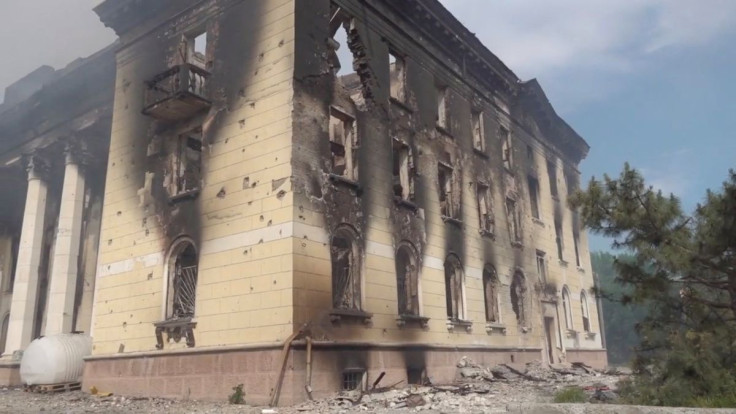Russian Shelling Triggers Fire In Eastern City Of Sievierodonetsk -governor

Russian shelling of the Azot chemical plant in the eastern Ukrainian city of Sievierodonetsk ignited a big fire on Saturday after a leak of tonnes of oil, the regional governor said, as the battle for the city raged on.
In neighbouring Donetsk province, Russian media reported that a huge cloud of smoke could be seen rising into the air after an explosion in the city of Avdiivka, which houses another chemical plant.
Weeks of fighting for Sievierodonetsk, a small city in Luhansk province that has become the focus of Russia's advance in eastern Ukraine, has pulverised sections of the town and has been some of the bloodiest since Moscow's Feb. 24 invasion.
The governor of Luhansk, Serhiy Gaidai, did not say whether the fire at the plant, where hundreds of civilians were sheltering, had been extinguished. Reuters could not independently verify the report.
Speaking on national television, Gaidai said non-stop fighting was raging in Sievierodonetsk. He said earlier that Russian forces controlled most of the city but Ukraine controlled the Azot chemical plant.
The Ukrainian armed forces' general staff said Ukrainian defenders repelled a Russian attack in one part of Sievierodonetsk on Saturday while fighting continues in another.
Ukrainian forces also pushed back a Russian attack on three small towns to the northwest of Sloviansk in Donetsk province, while fighting is continuing in a fourth settlement in the area, as well as to the east of the city, the staff said in a Facebook post.
Russia's RIA news agency posted video it said had been taken from Donetsk which showed a large smoke cloud rising from Avdiivka, which is currently held by Ukrainian forces and is just north of the city of Donetsk, which is controlled by Russian-speaking separatists.
Reuters was unable to immediately to confirm the RIA report or the authenticity of the video.
Ukraine has appealed for swifter deliveries of heavy weapons from the West to turn the tide of the war, saying Russian forces have at least 10 times more artillery pieces.
Ukrainian forces have proven more resilient than expected, but, in a report on Friday, the U.S.-based Institute for the Study of War said that as they use the last of their stocks of Soviet-era weapons and munitions, they will require consistent Western support to transition to new Western supplies and systems.
The institute said effective artillery would "be increasingly decisive in the largely static fighting in eastern Ukraine."
On Saturday, Germany's Bild am Sonntag newspaper, citing French and Ukrainian government sources, said German Chancellor Olaf Scholz will travel to Kyiv with French President Emmanuel Macron and Italian Prime Minister Mario Draghi before the Group of Seven summit at the end of June.
A German government spokesperson told Reuters they were not able to confirm the report and the Elysee Palace in Paris and the Italian government did not immediately respond to requests for comment.
None of the three leaders has been to Kyiv since Moscow's Feb. 24 invasion of Ukraine. Macron has sought to maintain a dialogue with Russian President Vladimir Putin since the war began, a stance some eastern and Baltic countries see as undermining efforts to push him to the negotiating table.
President Volodymyr Zelenskiy struck a defiant note on Saturday.
"We are definitely going to prevail in this war that Russia has started," he told a conference in Singapore via videolink. "It is on the battlefields in Ukraine that the future rules of this world are being decided."
Moscow turned to expanding control in the eastern Donbas region, where pro-Russian separatists had already held a swathe of territory since 2014, after being forced to scale back its initial more sweeping campaign goals.
Russian strikes knocked out power in Donetsk's two largest Ukrainian-controlled cities on Saturday, Kramatorsk and Sloviansk, regional Governor Pavlo Kyrylenko said.
Speaking on national television, he said it was part of a deliberate Russian strategy to cut off electricity in towns in Donetsk that remain in Ukrainian hands.
GRAIN SHORTAGES
The conflict between the neighbours - two of the world's biggest grain exporters - has reverberated well beyond Ukraine.
The United Nations said on Friday up to 19 million more people in the world could face chronic hunger in the next year because of reduced wheat and other food exports.
Ukraine's deputy agriculture minister said on Saturday up to 300,000 tonnes of grain may have been stored in warehouses in the Black Sea port of Mykolaiv that Kyiv says were destroyed by Russian shelling last weekend.
Turkey has tried to secure a deal so Ukraine can resume shipments from its Black Sea ports, which accounted for 98% of its cereal and oilseed exports before the war. But Moscow says Kyiv must clear the ports of mines and Ukraine says it needs security guarantees so it is not left exposed.
The battle for Sievierodonetsk and its destruction recall weeks of bombardment of the southern port city of Mariupol. It was reduced to ruins before Russian forces took control of that city last month.
Moscow has denied targeting civilians, but both sides say they have inflicted mass casualties on each other's forces.
Reuters has not been able to independently verify the battlefield reports in the conflict.
Russia calls its actions a "special military operation" to disarm and "denazify" Ukraine, while Kyiv and its allies call it an unprovoked war of aggression to capture territory.
© Copyright Thomson Reuters 2024. All rights reserved.







